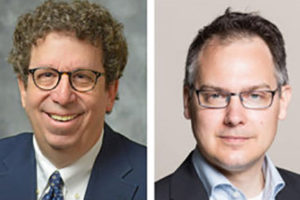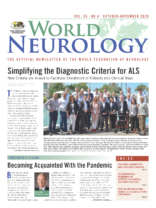By Steven L. Lewis, MD, Editor,
and Walter Struhal, MD, Co-Editor

Steven L. Lewis, MD, Walter Struhal, MD
We would like to welcome all neurologists worldwide to the October/November 2020 issue of World Neurology. This issue begins with the report from Matthew Kiernan for the ALS Consensus Committee, operating with the support of the WFN, about the development and publication of the new ALS diagnostic criteria, which are aimed to diminish ambiguity of patients’ diagnoses while also facilitating enrollment of patients into clinical trials. In this issue’s President’s Column, WFN President William Carroll reports on the current global efforts to understand, collaborate, and report on the neurologic aspects of COVID-19 and also updates us on the recent Annual General Meeting of the Council of Delegates, the success of the recent World Brain Day 2020, and recent and current successful efforts related to virtual education in the current era from the WFN, the national societies, and WFN specialty groups. In his recurring column on the WFN Committees and Specialty Groups, WFN Secretary-General Wolfgang Grisold updates us on the activities of the WFN Congress Committee and the WFN Specialty Group on Rare Neurologic Diseases.
In this issue’s history section, Aernoud T.L. Fiolet and Ingrid M. Daey Ouwens describe the history of malaria fever therapy as a treatment for general paralysis of the insane from neurosyphilis, which they provide as a cautionary tale in the current pandemic era with regard to potential pitfalls in urgently developed treatments. Also in this issue, Gustavo Roman, who was recently appointed as editor-in-chief of Cerebral Circulation, issues a call for papers for this new publication.
This issue is distinguished by having a number of articles highlighting a sampling of some of our member societies’ successes related to World Brain Day 2020, including the report from India from Chandrashkhar Meshram, Pramod Kumar Pal, Gagandeep Singh, Nirmal Surya, and Vinay Goyal; a report from Pakistan by Abdul Malik; a report from Man Mohan Mehndiratta and colleagues from New Delhi on his suggestions for a successful virtual advocacy effort; and finally, a report by Marcelle Smith and Patty Francis on the current status of Parkinson’s Disease in Africa, particularly from their South African perspective.
Much of the remainder of this issue is devoted to the important new world of international virtual conferences related to the WFN, in addition to the recent very successful AFAN/WFN E-Learning Day, which was held on Oct. 10 and so skillfully led by Riadh Gouider, WFN Trustee, and discussed in the President’s column. This issue features reports from Abderrahmane Chahidi, Zouhayr Souirti, Mohamed Chraa, Najib Kissani, and Reda Ouazzani from the Moroccan Society of Neurophysiology and Moroccan League Against Epilepsy on their highly attended and successful International Webinars of Experts in Clinical Neurophysiology, and the report by Chandrashkhar Meshram on the WFN Neuroinfection Series (cosponsored by the Forum for Indian Neurology Education [FINE]) that is now on its second set of highly attended and remarkable lectures and case presentations on neuroinfectious disease. These internationally presented and globally attended lecture series represent highly effective and (and in these cases, free) educational efforts; in fact, the creation of these remarkable online (live and archived) educational opportunities are the true silver linings of the current pandemic and we encourage neurologists worldwide to attend and learn from as many of these virtual lecture series as possible.
On a similar note, John England, Wolfgang Grisold, and Juan J. Vilchez report on the recent International Congress on Neuromuscular Diseases (ICNMD), which was both highly successful and well attended in its virtual format for 2020.
Finally, the issue concludes with a heartfelt report from Guillermo Delgado-García, who details his visit to “The Neuro” (the Montreal Neurological Institute) under the auspices of the WFN and the Canadian Neurological Society.
We look forward to receiving reports from the field as you care for your neurological patients throughout the world during this pandemic, and wish you all the best of health and safety. •
